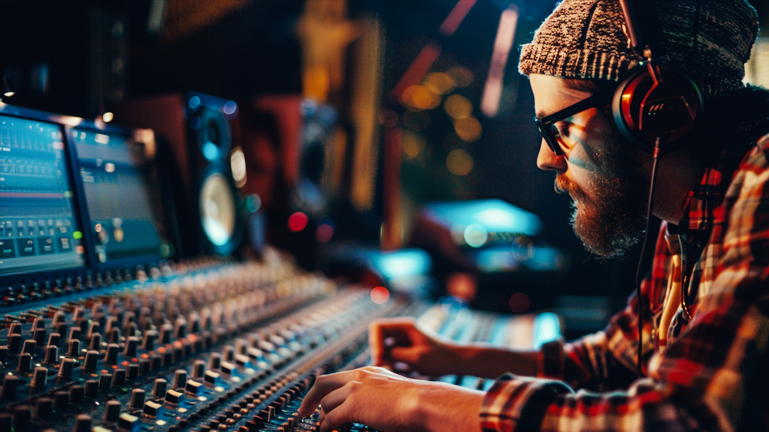Essential Skills and Tools
What Makes a Modern Day Audio Engineer?
In today's high-definition audio landscape, modern audio engineers emerge as key innovators behind the scenes in music, podcasts, films, and live performances. This article explores the crucial mix of technical prowess, creative vision, and versatile skills that define today's audio professionals, highlighting their impact on our auditory experiences.
Evolution of Audio Engineering
The journey from analog mixers and tape machines to sophisticated digital platforms marks the dramatic evolution of audio engineering. This transformation has not only enhanced sound quality and editing capabilities but also revolutionized the entire workflow in sound production.
From Analog to Digital
- Historical Context: Traditionally, audio engineers mastered the art of microphone placement, analog mixing, and tape-based editing. Early limitations often meant that engineers had to rely heavily on their foundational skills without the support of advanced technology.
- Digital Era: The advent of digital audio workstations (DAWs) has revolutionized audio engineering, providing unprecedented precision and flexibility. Today, DAWs like Avid Pro Tools, Apple Logic Pro, and Ableton Live, paired with state-of-the-art audio plugins from developers like Waves, iZotope, and Black Rooster Audio, allow engineers to manipulate sound with incredible detail and creativity.
Core Competencies of a Modern Audio Engineer
Today’s audio engineers must possess a diverse set of skills that extend well beyond the traditional scope of audio production.
"Today's technology has taken us to a place that we could never have dreamed of back in the early days. We have tools that allow us to manipulate sound in ways that are almost unlimited, which is incredibly exciting for any audio engineer." - Bob Clearmountain
This sentiment captures the enthusiasm many audio professionals feel about advancements in digital audio workstations, plugins, and other modern tools that redefine their capabilities and creativity.

Technical Mastery
- DAWs Proficiency: Essential for modern audio engineering, proficiency in DAWs allows for intricate sound manipulation and efficient project workflows.
- Expert Editing: Skilled in detailed track arrangement and precise time-domain manipulations.
- Advanced Mixing: Mastery in adjusting sound levels and achieving balance across the audio spectrum is critical.
- Plugin Mastery: Utilizing audio plugins to enhance sound with effects such as reverb, compression, and EQ for superior audio quality.
Acoustic Science
- Sound Physics: Engineers must understand sound dynamics to optimize recording environments and equipment setups.
- Spatial Awareness: Knowledge of sound layering, stereo imaging, and the impact of sound placement in mix arrangements enhances the depth and clarity of the audio.
Problem Solving and Soft Skills
- Adaptive Troubleshooting: Quick problem-solving is essential, especially in live settings or complex sessions.
- Interpersonal Skills: Navigating studio dynamics and supporting artists psychologically can significantly impact the productivity and creativity of a session.
Modern Tools for Audio Engineers
The continual advancement in audio technology equips today's audio engineers with tools that push the boundaries of what's possible in sound production.
Cutting-Edge Software and Plugins
- Comprehensive DAWs and Plugins: Tools like Avid Pro Tools, Apple Logic Pro, Ableton Live, Steinberg Cubase and plugins from e.g. Black Rooster Audio, are crucial for achieving professional-grade sound and innovative audio effects.
High-Quality Recording Gear
- Premium Microphones and Monitors: Brands like Neumann, Shure, Genelec, and Yamaha are synonymous with quality and reliability, ensuring pristine recordings and accurate sound reproduction.
Immersive Audio Technologies
- VR and Spatial Audio: Technologies such as Dolby Atmos and binaural audio are reshaping the creation of immersive audio experiences in virtual and augmented realities.
Creativity and Innovation in Audio Engineering
While technical skills form the backbone of audio engineering, creativity drives the soul of the profession. Modern engineers actively contribute to the creative process, pushing the boundaries of sound design.
Collaboration and Innovation
- Collaborative Projects: Engineers work closely with artists and producers to bring creative visions to life.
- Sound Design Exploration: Experimenting with novel audio techniques and technologies to craft unique soundscapes.
Future Trends in Audio Engineering
The horizon for audio engineering is vibrant with potential advancements in AI, machine learning, and 3D audio. These technologies are set to further enhance automation, improve sound quality, and deepen immersive audio experiences.
Modern audio engineers are integral to the media landscape, blending artistry with technical expertise. Their continuous adaptation to evolving tools and technologies, coupled with a creative and analytical mindset, cements their role as indispensable architects of contemporary sound.

Add a comment